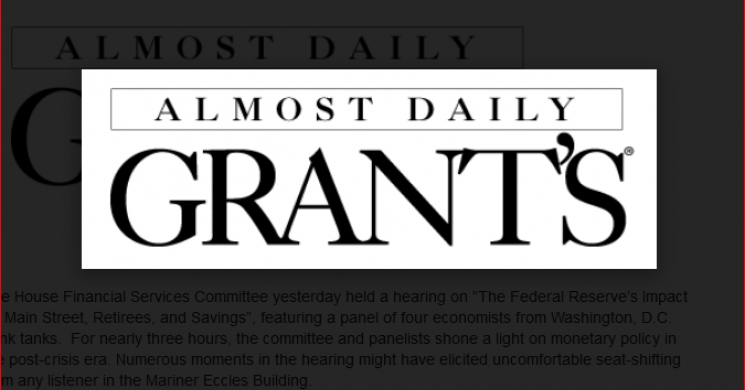
Preaching to the choir
The House Financial Services Committee yesterday held a hearing on “The Federal Reserve’s Impact on Main Street, Retirees, and Savings”, featuring a panel of four economists from Washington, D.C. think tanks. For nearly three hours, the committee and panelists shone a light on monetary policy in the post-crisis era. Numerous moments in the hearing might have elicited uncomfortable seat-shifting from any listener in the Mariner Eccles Building.
Norbert J. Michel of the Heritage Foundation found that CPI inflation has averaged 3.35% since 1913, compared to 0.22% in the preceding 123 years (for more see “Cheer up Charlie”, Almost Daily Grant’s, June 21). Following the adoption of the price stability mandate in 1977, CPI inflation averaged 3.74% during the 1979-2013 period. Michel further commented:
Consequently, the long-term purchasing power of the dollar has dramatically declined. Anyone not lucky enough to receive an automatic raise every year as the CPI crept up probably does not view the reduction in variability as a great improvement, no matter what macroeconomists think.
Federal Reserve officials also seem to be thrilled with the idea of stamping out the good type of deflation that a growing capitalist economy would normally produce. Though virtually everyone in Main Street America understands exactly why the Wal-Mart business model benefits them, the Fed appears bent on stamping out Wal-Mart’s low prices. For the Fed, deflation has become synonymous with depression, even though the empirical evidence suggests otherwise.
Paul H. Kupiec of the American Enterprise Institute offered a tangible suggestion for enhancing Congressional oversight of the central bank: releasing the Fed chair’s written semi-annual Humphrey Hawkins testimony well in advance of the hearing date, which would allow for non-Fed experts to offer detailed feedback that could inform more robust questioning from Congress.
An intriguing idea from our perch at 2 Wall Street, likely less so at Eccles.
Perhaps the most effective salvos of all were landed by Alex J. Pollock of the R Street Institute, who calculated that monetary policy since 2008 has led to a net $2.4 trillion wealth transfer away from savers. Pollock then went for the knockout blow, challenging the premise of the Fed’s raison d’etre:
There can be no doubt that taking $2.4 trillion from some people and giving it to others is a political decision and a political act. As a clearly political act, it should be openly and clearly discussed with the congress…analyzing the economic and social implications.
If you believed that the Federal Reserve had superior knowledge and insight into the economic and financial future, you could plausibly conclude that it should act as a group of philosopher-kings and enjoy independent power over the country. But no one should believe this. It is obvious that the Fed is just as bad at economic and financial forecasting as everyone else is. It is unable to consistently predict the results of its own actions. There is no evidence that it has any special insight. That is in spite of (or perhaps because of) the fact that it employs hundreds of Ph.D. economists.
Moreover, the notion of philosopher-kings is distinctly contradictory to the genius of the American constitutional design. Seen in a broader perspective, the Federal Reserve is an ongoing attempt at price fixing and central planning by committee. Like all such efforts, naturally it is doomed to recurring failure.
Had the denizens of Grant’s been in attendance, perhaps a standing ovation would have interrupted Pollock’s remarks. As it happens, we and the ranks of Fed-skeptics everywhere shouldn’t get too excited just yet. The hearing looked to draw just about half a dozen attendees seated behind the panelists, most of whom appearing to be staff.
Well, as a wise baseball fan once said: there’s always next year.
CLICK HERE to begin a six-issue Trial Subscription to GRANT'S. Offer ends July 15, 2017.
Read more by Soren K.Group







